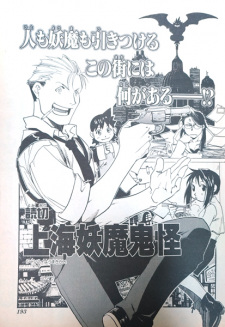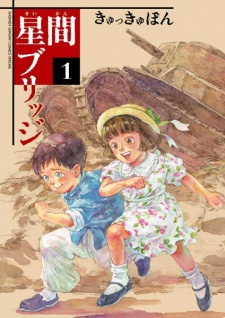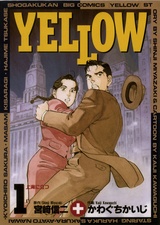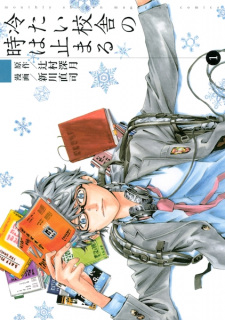Sep 27, 2009
Some of you will have noticed that some of my recent reviews have focused on the work Arakawa Hiromu, the creator of Full Metal Alchemist and Jyuushin Enbu: Hero Tales. Aside from those two series, she has produced several successful one-shots as well. Shanghai Yomakikai (Demons of Shanghai), is the manga that built on the success of her debut work, Stray Dog and, while it's only a short series (4 chapters), it showcases her creative mind at work in a way that Stray Dog never could, and effectively paved the way for the creation of Full Metal Alchemist and her later works.
Shanghai Yomakikai is set
...
in the year 2050. The rest of the world has undergone a scientific and technological change, however Shanghai is still known as the "Demon Capital" due to the number of supernatural beings who live there, some of whom have no desire to be friendly with humans. Since the conventional police are unable to deal with these beings, the task is given to the Demon Taoists Corporation, a small group of people who form the last line of defence against the monsters.
Initially the premise sounds very dark and ominous however, like most of Arakawa's work, first impressions are highly deceiving. Shanghai Yomakikai is anything but serious. The plot is pretty standard at heart, but where the story becomes original and very inventive is in it's usage of old ideas, and the spin that is put on old characters is very well handled. The pacing is pretty good overall, and the story flows very well from one panel to the next.
The first two chapters are effectively individual stories, with chapter 1 also forming a pretty decent introduction to the main characters. The last two chapters follow directly on from each other, and even though the ending is a lot more open than most people would prefer, I think it works rather nicely as one gets the impression that it's simply business as usual for the Demon Taoists Corporation.
Those of you who've read some of Arakawa's other works will be familiar with her tendency to draw simple, clean, yet slightly "cartoony" characters, and Shanghai Yomakikai is no exception to this. Even the monsters have a slightly surreal look about them, and don't really appear to be scary in any way.
Also present is Arakwa's tendency to leave the backgrounds out or to only put in enough detail to give the action a sense of place. There's more use of visual effects in this manga (speed lines, etc), to give the action and antics a sense of movement, and these are used to good effect.
The one downside is the fact that it sometimes seems as though Arakawa's penchant for the ridiculous has taken over. Thankfully these occasions are fairly infrequent, but given the amount of action and humour involved in the manga it can sometimes be difficult to tell.
Shanghai Yomakikai has a number of characters who appear throughout it's 4 chapters. The members of the Demonic Taoist Corporation are all completely individual characters, with personalities to match. Jack, one of the corporations field agents, is very much the star of the show, and his relationships with his colleagues and those around him are often very funny. No matter how much of a tough guy he is though, he is still afraid of his female boss, Director Nynetales, who "disciplined him and taught him proper manners" (Jack's polite description since she was standing right behind him).
The other members of the Demonic Taoist Corporation, Yan (Jack's partner in the field), Su-An (a kid), and Holy Emperor Guan Yun-Chang (Jack's temporary replacement and part time office junior), are all very wierd, and absolutely hilarious at times. Su-An's efforts to help in the last two chapters were a work of creative brilliance, and this is not the only example of irrelevant facts becoming very funny (you'll understand when you read it).
This is a very well written and choregraphed piece of manga comedy that I really don't want to classify as horror even though it has supernatural beings like vampires. Following the success of Stray Dog, Arakawa stated that she want to do some light-hearted comedy, and she has put pretty much everything she likes into this manga, with surprisingly good results. From the first page this series grabs the reader's attention with it's "serious" introduction, and it's this seriousness scattered throughout the manga that gives much of the comedy an ironic (and slightly cynical), twist that would otherwise be missing.
If you're a fan of Arakawa's work, or you're just looking for something that can make you laugh, then this is definitely worth reading. The mixture of action and comedy is very well presented, and the humour is of a standard that will appeal to most people.
I just hope that some kind studio will decide to animate this at some point in the future, as it's a story that would work extremely well in that medium.
Reviewer’s Rating: 8
What did you think of this review?
Nice
 0
0
Love it
 0
0
Funny
 0
0
Confusing
 0
0
Well-written
 0
0
Creative
 0
0Show all


 (1).png)






















